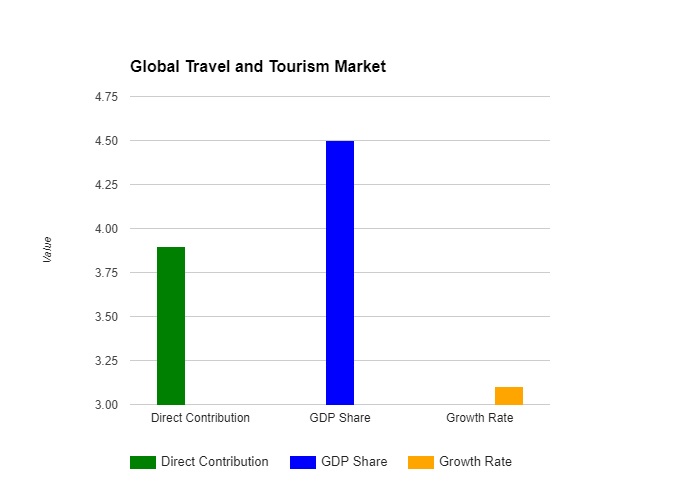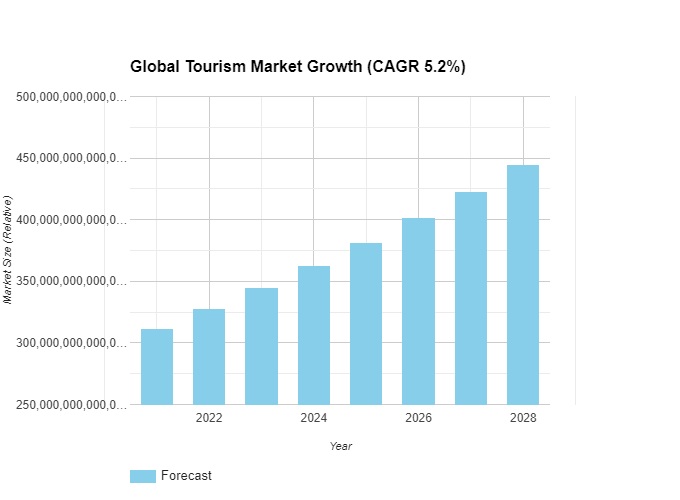Introduction
The Tourism Market has witnessed remarkable growth and transformation in recent years, driven by various factors such as increasing disposable income, technological advancements, and a growing desire for experiential travel. In this article, we will explore key aspects of the tourism market, including its size, revenue, growth, international trends, top players in the travel and tourism industry, and future outlook.
Tourism Market Size, Share, and Revenue
The Tourism Market has emerged as a significant contributor to the global economy, with a substantial market size and a growing share. According to ken Research, the global tourism market size was estimated at $1.7 trillion in 2022, representing a steady increase from previous years. The market share of tourism in the overall global economy is projected to reach 10% by 2025, highlighting its pivotal role in various countries’ economic landscapes.
In terms of revenue, the tourism industry has experienced robust growth, driven by increased international travel and changing consumer preferences. The Research Reports reported that the direct contribution of the travel and tourism sector to global GDP reached $3.9 trillion in 2021, accounting for 4.5% of total GDP. Furthermore, this contribution is expected to grow by 3.1% annually over the next decade, emphasizing the industry’s sustained economic impact.

International Tourism Market Trends
The dynamics of international tourism market are continually evolving, shaped by geopolitical developments, technological advancements, and shifting consumer behaviors. One prominent trend is the rise of sustainable and responsible tourism, with travelers increasingly seeking eco-friendly and socially responsible experiences. According to Ken Research, 87% of global travelers expressed a desire to travel sustainably in 2022.
Another significant trend is the growing popularity of immersive and cultural experiences. Travelers are increasingly seeking authentic interactions with local communities, leading to the rise of experiential tourism. This trend is reflected in the increased demand for homestays, cultural tours, and off-the-beaten-path destinations.
Top Players in the Travel and Tourism Industry
The travel and tourism industry are highly competitive, with several key players dominating the market. As of 2022, the top players in the industry include multinational hospitality companies, online travel agencies, and airlines. The leading players in the global tourism market include The Walt Disney Company, Marriott International, Expedia Group, and Delta Air Lines.
These industry giants leverage their extensive networks, strong brand presence, and technological innovations to capture a significant share of the market. However, the industry’s landscape is also marked by the emergence of disruptive technologies and new entrants, fostering innovation and competition.
Tourism Market Research Reports
In-depth market research plays a crucial role in understanding the ever-changing dynamics of the tourism industry. Tourism Market Research Reports provide valuable insights into market trends, consumer behavior, and competitive landscapes. For instance, the global tourism market will grow at a compound annual growth rate (CAGR) of 5.2% from 2021 to 2028.
Such reports help industry stakeholders make informed decisions, identify growth opportunities, and mitigate potential risks. They often include detailed analysis of market segments, regional trends, and key players, offering a comprehensive view of the current state and future prospects of the tourism market.

Tourism Market Future Outlook
Looking ahead, the future outlook of global tourism market remains optimistic, albeit with certain challenges and uncertainties. The recovery from the impact of the COVID-19 pandemic is expected to continue, with international travel gradually returning to pre-pandemic levels. The Market forecasts a rebound in international tourist arrivals by 2023, with an estimated growth rate of 25% compared to 2022.
Additionally, the integration of technology, such as artificial intelligence and blockchain, is poised to reshape the industry, offering enhanced efficiency, personalized experiences, and improved security. Digital platforms, mobile applications, and virtual reality are expected to play a pivotal role in shaping the future of travel and tourism.
Conclusion
In conclusion, the global tourism market is a dynamic and resilient industry that has weathered challenges and adapted to changing consumer preferences. With a substantial market size, steady revenue growth, and emerging trends, the tourism sector continues to be a key driver of economic development worldwide. As the industry navigates the post-pandemic landscape and embraces technological advancements, stakeholders must remain vigilant, informed, and adaptable to capitalize on the numerous opportunities presented by the evolving global tourism market.



